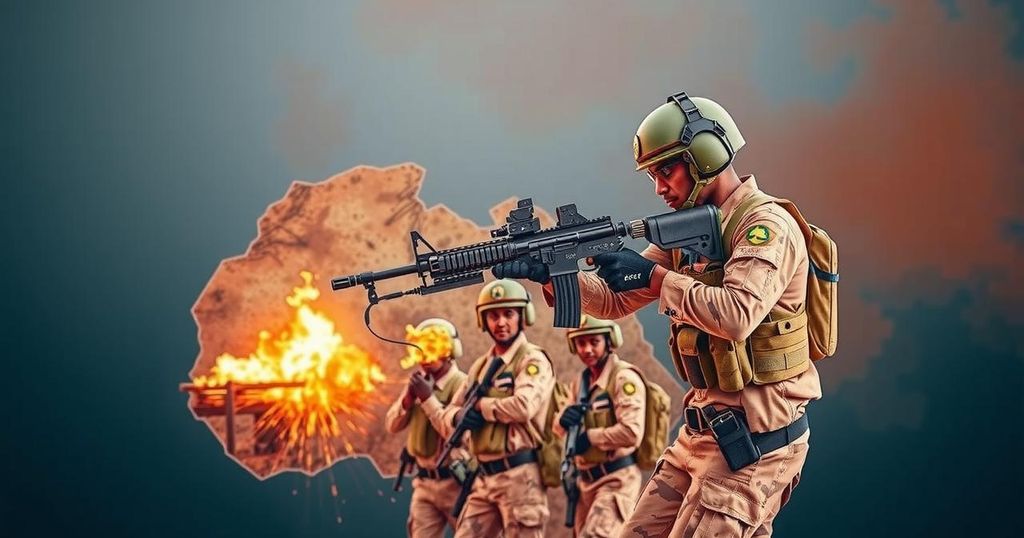Egypt is enhancing its military operations in Somalia ahead of the Ethiopian troops’ withdrawal by December 31, 2024. Following a military cooperation agreement, Egypt is deploying military advisors and counter-terrorism units to support Somali forces against Al-Qaeda affiliates. The tensions with Ethiopia over the Nile and regional security further complicate the political landscape, as both nations seek to assert their interests in Somalia.
Egypt is significantly enhancing its military presence in Somalia as it prepares for the imminent withdrawal of Ethiopian troops by the December 31 deadline. This strategic military collaboration comes at a time when Egypt is actively training Somali security forces to combat Al-Qaeda-affiliated groups. Following the signing of a critical military cooperation agreement with Somalia in August, Egypt has deployed weapons, military advisors, and elite counter-terrorism units to Mogadishu. By year-end, it is projected that thousands of Egyptian personnel will be involved in this mission, marking a pivotal moment in regional security dynamics. The context of this build-up is underscored by the ongoing tensions between Egypt and Ethiopia over the Nile River and its resources. Ethiopia currently maintains a contingent of approximately 22,000 troops in Somalia under bilateral agreements and as part of an African Union mission aimed at stabilizing the region against Al-Shabaab insurgents. Both Cairo and Mogadishu have expressed discontent with Ethiopia’s expansionist maneuvers, particularly concerning a controversial port agreement with Somaliland that threatens Somalia’s sovereignty and exacerbates the ongoing disputes surrounding the Grand Ethiopian Renaissance Dam. As Egypt looks to supplant Ethiopian troops, Somali forces, supported by Egyptian advisors, have already been positioned along crucial supply routes to deter any potential attempts by Ethiopia to bolster its military presence pre-withdrawal. Ethiopia, in turn, has reacted by increasing its troop numbers, alleging that foreign military involvement could destabilize Somalia further. These developments are reflective of the broader geopolitical tensions that characterize the Horn of Africa today, with Egypt seeking to leverage its military capabilities to ensure national security and regional influence. Additionally, discussions between Egyptian President Abdel Fattah El Sisi and leaders in the Horn of Africa emphasize Egypt’s commitment to supporting Somalia’s security framework. In recent meetings, President El Sisi reiterated Egypt’s intention to assist Somalia in restoring stability and security, aligning with Egypt’s strategic interests in the Horn of Africa. The recent summit in Asmara between Egypt, Somalia, and Eritrea indicates Egypt’s maneuvering to strengthen alliances within the region while countering perceived Ethiopian aggression. The history of strained relations between Egypt and Ethiopia, primarily over water rights and the Nile’s management, continues to inform Cairo’s military and diplomatic strategies. As these dynamics evolve, the region faces an uncertain future where military actions and cooperative agreements play crucial roles in shaping the political landscape.
The situation involves intricate geopolitical negotiations within the Horn of Africa, particularly between Egypt, Ethiopia, and Somalia. Egypt’s military mission in Somalia is largely a response to the withdrawal of Ethiopian forces, which has ramifications for security and sovereignty in the region. The historical context of the Nile River dispute and the Grand Ethiopian Renaissance Dam’s construction fuels rivalry and complicates alliances, with implications for broader regional stability. The dynamics of military cooperation and counter-terrorism efforts against groups like Al-Shabaab are central to understanding Egypt’s strategic objectives in Somalia amidst evolving political relations with Ethiopia.
In conclusion, Egypt’s military escalation in Somalia is a calculated move to replace Ethiopian troops by the end of the year, influenced by ongoing tensions over the Nile and regional stability concerns. The strategic agreements with Somalia highlight Cairo’s commitment to counter-terrorism and regional security. With Ethiopia adopting a defensive stance, the potential for increased militarization in the Horn of Africa underscores the urgent need for diplomatic resolutions to ensure lasting peace and cooperation among neighboring states.
Original Source: www.thenationalnews.com






